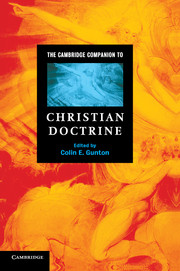Book contents
- Frontmatter
- Part one Christian doctrine in the late twentieth century
- 1 Historical and systematic theology
- 2 On doctrine and ethics
- 3 The basis and authority of doctrine
- 4 The scope of hermeneutics
- 5 Christ and the cultures: The Jewish people and Christian theology
- 6 Christ and the cultures: Christianity and the arts
- Part two The content of Christian doctrine
- 7 The triune God
- 8 The doctrine of creation
- 9 Human being, individual and social
- 10 Redemption and fall
- 11 The church and the sacraments
- 12 Eschatology
- 13 Jesus Christ
- 14 The Holy Spirit
- General index
- Index of biblical references
12 - Eschatology
Published online by Cambridge University Press: 28 May 2006
- Frontmatter
- Part one Christian doctrine in the late twentieth century
- 1 Historical and systematic theology
- 2 On doctrine and ethics
- 3 The basis and authority of doctrine
- 4 The scope of hermeneutics
- 5 Christ and the cultures: The Jewish people and Christian theology
- 6 Christ and the cultures: Christianity and the arts
- Part two The content of Christian doctrine
- 7 The triune God
- 8 The doctrine of creation
- 9 Human being, individual and social
- 10 Redemption and fall
- 11 The church and the sacraments
- 12 Eschatology
- 13 Jesus Christ
- 14 The Holy Spirit
- General index
- Index of biblical references
Summary
Eschatology has traditionally been understood as the doctrine of the last things (eschatos is the Greek word for 'end'). In manuals of doctrine, the four last things were often identified as resurrection, judgement, heaven and hell. The task of eschatology was to elucidate these on the basis of information contained in scripture and tradition. In this way eschatology was the final piece in the jigsaw of Christian belief, and could be set out largely in isolation from the exposition of other doctrines.
One of the hallmarks of twentieth-century theology has been its insistence that eschatology is a central Christian doctrine and conditions every other article of faith. The doctrine of the last things is already embedded within any adequate Christian account of God and creation. One can understand neither the being and action of God nor the purpose of creation without reference to the final end that has been appointed for all nature and history. This eschatological turn in modern theology determines the treatment of scripture, God, creation, Christ, the Holy Spirit and the Christian life.
- Type
- Chapter
- Information
- The Cambridge Companion to Christian Doctrine , pp. 226 - 244Publisher: Cambridge University PressPrint publication year: 1997
- 1
- Cited by

